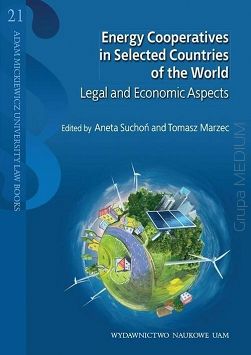Energy Cooperatives in Selected Countries of the World. Legal and Economic Aspects
- Dodaj recenzję:
- Kod: 5430
- Producent: Wydawnictwo Naukowe Uniwersytetu Adama Mickiewicza
- Autor: red. Aneta Marzec, Tomasz Suchoń
-
-
- szt.
- Cena netto: 45,71 zł 48,00 zł
Energy Cooperatives in Selected Countries of the World. Legal and Economic Aspects
rok wydania: 2023
ISBN: 978-83-232-4170-6
ilość stron: 298
format: 17,5x24,5 cm
oprawa: twarda
Opis
Energy security is important for individuals and business entities as well as for the sustainable development of the economy of each country in the world. Current problems related to the continuity of energy supplies and higher prices of energy can be solved, at least to some extent, by energy cooperatives. These cooperatives are active in producing, providing and distributing energy. They can effectively harness locally available decentralized renewable energy and have also proven to be supportive of technological innovation. These entities are increasingly being formed in countries as varied as Germany, Italy, Denmark, Bolivia, Spain, Argentina and France, United States, Brazil and Poland. Cooperatives are also part of community energy, as this form meets the needs and expectations of citizens regarding energy, especially renewable.
The book presents the legal and economic aspects of the functioning of energy cooperatives and other cooperative entities operating in the field of renewable energy sector. It also presents selected legal and economic issues related to energy communities, closely related to energy cooperatives.
Spis treści
Foreword
Introduction
Preface and Acknowledgements
Notes on the Contributors
Chapter 1
Introductory Considerations, Aneta Suchoń
Chapter 2
To Solve a Problem, It Must First Be Named: A Register of Regulatory Barriers to Energy Communities, Piotr Mikusek and Maciej M. Sokołowski
Chapter 3
Establishment of a Regulatory Framework for Energy Communities—Certain Legal Challenges, Tomasz Długosz
Chapter 4
Legal Perspectives on the Interaction of Municipalities and Citizens in the German Energy Transition, Felix Lindschau, Thomas Schomerus, Lars Holstenkamp and Christian Kriel
Chapter 5
A Constitutional Approach to Cooperatives and Energy, Antonios Maniatis
Chapter 6
The Role of Energy Cooperatives in the German Energy Transition, Andreas Wieg
Chapter 7
The Bulgarian Cooperatives—Their Integration and Significance to the Production of Renewable Energy in Bulgaria, Minko Georgiev and Boryana Ivanova
Chapter 8
Energy Co-op Icon with an Emphasis on Spain and Greece, Antonios Maniatis
Chapter 9
Energy Cooperatives and Social Vulnerability in Spain, Koldo Martín Sevillano
Chapter 10
Legal Determinants of Energy Cooperatives’ Development in Poland, Tomasz Marzec
Chapter 11
Relationship of Energy Cooperatives with the Energy Companies Indicated in the Renewable Energy Sources Act: Impact on Internal Settlements within the Energy Cooperative, Piotr Kolasa
Chapter 12
The Contribution of Different Types of Cooperatives to the Production and Use of Renewable Energy in Poland—Selected Legal Issues, Aneta Suchoń
Chapter 13
Powering Up: Exploring Energy Cooperatives in Taiwan through a Case Study and the Analysis of Regulatory Frameworks and Operating Principles, Hui-Tzu Huang
Chapter 14
Energy Cooperatives in Brazil, Igor Loureiro de Matos
Chapter 15
Final Considerations and References to the Current Political, Economic and Legal Situation Concerning Energy Cooperatives, Energy Communities and the Energy Market, Aneta Suchoń, Piotr Mikusek, Maciej M. Sokołowski, Tomasz Długosz, Felix Lindschau, Thomas Schomerus, Lars Holstenkamp, Christian Kriel, Antonios Maniatis, Minko Georgiev, Boryana Ivanova, Koldo Martín Sevillano,Tomasz Marzec, Piotr Kolasa, Hui-Tzu Huang and Igor Loureiro de Matos
Appendix
The International Cooperative Alliance, Santosh Kumar
The Energy Transition to Energy Democracy in Europe, Dirk Vansintjan
Partners of the publication
Stowarzyszenie na rzecz efektywności im. prof. Krzysztofa Żmijewskiego
Związek Stowarzyszeń Polska Zielona Sieć



